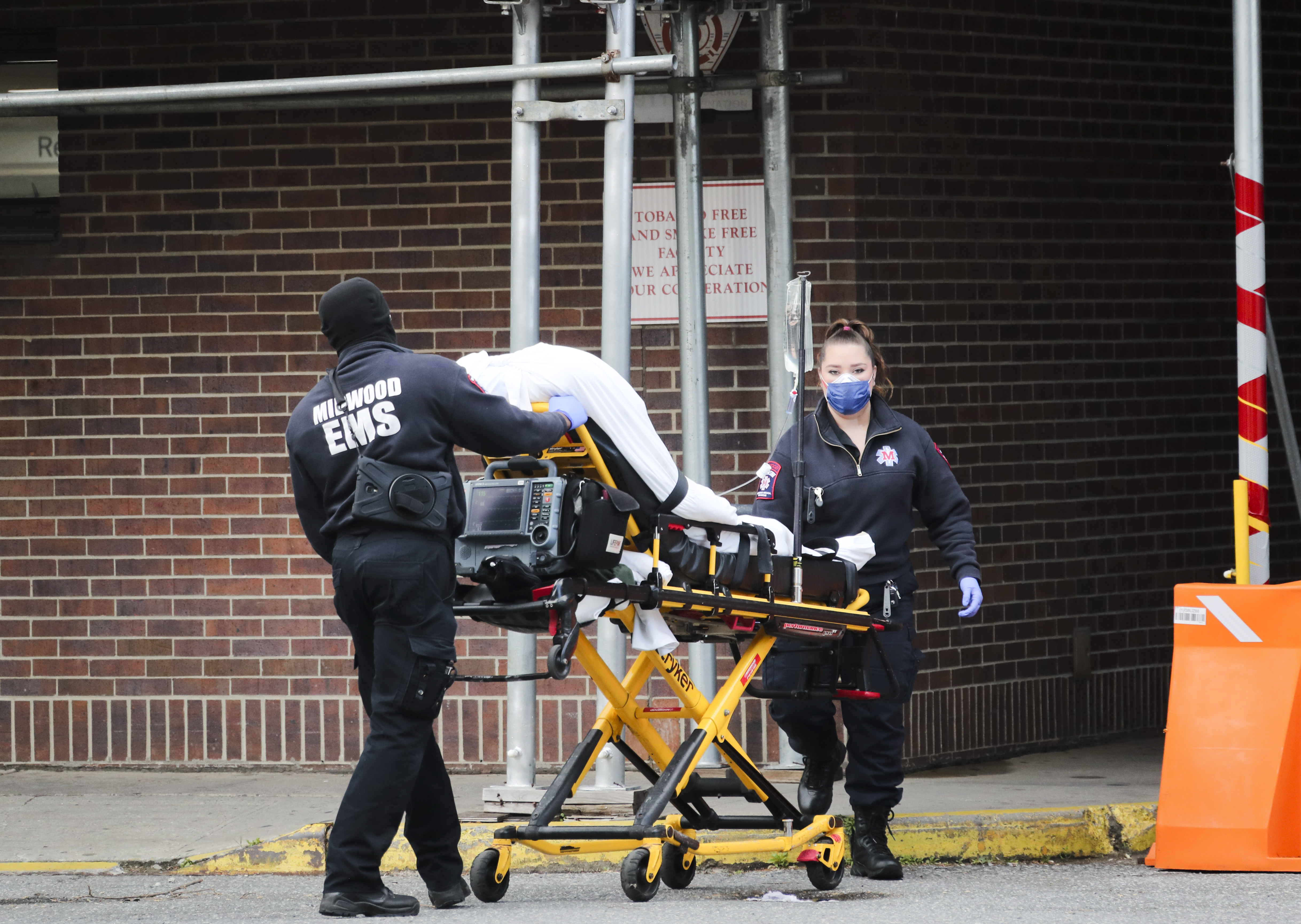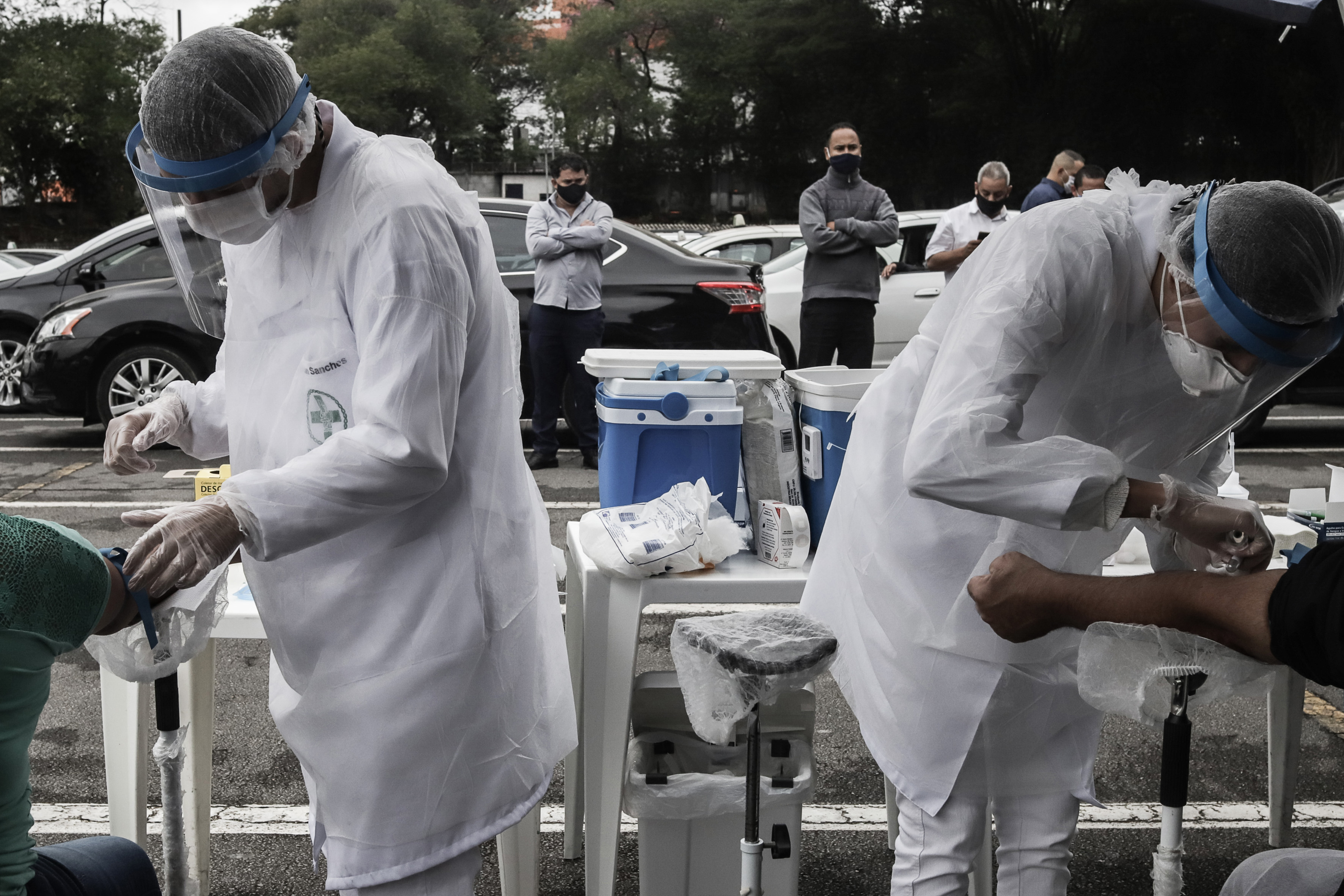-- "The U.S. government reacted too slowly and with insufficient central authority to avert the enormity of the pandemic calamity."
-- Some countries are striving to reopen their economies with preventive measures not being strictly followed.
-- Effective global cooperation, which plays an essential role in curbing the rampant spread of the virus, is in urgent need.

Healthcare workers wheel a patient into Brooklyn Hospital Center in Brooklyn of New York, the United States, on May 11, 2020. (Xinhua/Wang Ying)
BEIJING, July 9 (Xinhua) -- The world is witnessing shattered COVID-19 records with skyrocketing daily confirmed cases that surpassed 200,000 earlier this week.
The soaring infections are forcing countries to suspend plans to ease restrictions on public life and gradually reopen economies. Lockdowns have been re-imposed in cities from Western Europe to the Pacific Ocean, and hospitals in America are once again overwhelmed, sounding the alarm for an even deadlier coronavirus resurgence.
It has been nearly half a year since the onset of the COVID-19 outbreak. Yet some countries are struggling to flatten the curve while pushing forward premature reopening policies, analysts and experts say.
Facing such a dire situation, there is a need for global cooperation and persistent, substantial and science-based action to end the pandemic.
RECORD-BREAKING PACE
It took only 10 days for the coronavirus infections worldwide to reach 11.9 million as of Thursday from the grim 10 million mark, according to data by Johns Hopkins University.
The Americas have been the coronavirus epicenter as the United States, with more than 3 million cases, is the worst-hit country, followed by Brazil with about half of the U.S. caseload.

Photo taken on July 7, 2020 shows the Capitol Building in Washington, D.C., the United States. (Xinhua/Liu Jie)
The United States, whose entire 50 states partially reopened in May, is experiencing a renewed resurgence in infections, with daily new cases in the states of Florida, California and Texas breaking new records.
Florida has seen its caseload soar past 10,000 per day and 200,000 overall. More than four dozen hospitals in the sunshine state reported that their intensive care units have reached full capacity on Tuesday. Local authorities were forced to close beaches packed with people wearing no masks and keeping inadequate social distance.
The situation is horrifying, while the real picture may be far worse. U.S. Centers for Disease Control and Prevention Director Robert Redfield said in late June that cases in the country are likely to be 10 times higher than reported.
Anthony Fauci, director of the U.S. National Institute of Allergy and Infectious Diseases, warned Monday "a series of circumstances associated with various states and cities trying to open up, in the sense of getting back to some form of normality, has led to a situation where the country now has record-breaking cases."
Under attacks for a shaky handling of the pandemic, the White House insisted that the spike is a result of expanded testing, a claim rejected by many public health experts.
U.S. media Politico said in a recent opinion piece that the United States still doesn't have a handle on testing six months into the pandemic.
"Politicians who point to the 'higher number of tests being done' and to the 'lower death and hospitalization rate' as a good thing are merely distorting reality," said Robert Schooley, a professor of medicine with the Division of Infectious Diseases and Global Public Health at the University of California. "More infection is the issue, not more testing."
"No doubt, the U.S. government reacted too slowly and with insufficient central authority to avert the enormity of the pandemic calamity," said Robert Lawrence Kuhn, chairman of the Kuhn foundation.
FRAGILE BALANCE
Outside the Americas, premature reopening decisions and loose prevention and control measures have dragged several cities to lockdown. Regional governments in northern Spain re-imposed restrictions over the weekend to contain a spike in new cases, while the Australian state of Victoria announced a six-week lockdown on Tuesday in addition to the border closure of the entire country.
Meanwhile, resurgence have also occurred in the Middle East, where some countries are striving to reopen their economies with preventive measures not being strictly followed, breaking a fragile balance between reopening and controlling the spread of the virus that requires government-led, nationwide efforts with vigilance, prudence and persistence.
Turkey has witnessed a worrying jump in infections since June 12, after the country reopened public areas on June 1. As the country continues to register over 1,000 new cases daily, the wearing of face masks in public places was made mandatory to curb the spread.

Workers wearing masks are seen outside a food stand in Istanbul, Turkey, on July 1, 2020. (Xinhua/Xu Suhui)
"The reason why our new daily cases are over 1,000 is because the rules are not followed," Turkish Health Minister Fahrettin Koca said Monday.
Moreover, the Israeli government reimposed several restrictions, including closing gyms, bars, night clubs and event halls, as well as limiting the number of worshippers in synagogues on Monday, just weeks after a relief of strict measures.
"We have to enforce the regulations. We saw gatherings of 1,000 people not wearing masks ... People are not disciplined enough, and (the) government has to take active measures," said Cyrille Cohen, vice dean of the faculty of life science at Israel's Bar Ilan University, over the rise of infections in Israel.

An empty restaurant is seen in the central Israeli city of Tel Aviv amid COVID-19 pandemic on July 6, 2020. (Photo by Gil Cohen Magen/Xinhua)
Gina Tambini, representative in Colombia of the Pan American Health Organization, stressed the need to take into account the diverse environments of each city in each country, and recommended lockdown measures not be relaxed until the speed of transmission is brought under control.
"Local and national governments must allow the dynamics of transmission to dictate their timeline for establishing measures and reopening. The goal is to flatten the curve and then significantly reduce it before relaxing any restrictions," she said.
LACK OF COOPERATION
Besides mandatory guidelines from local authorities and smart and cautious reopening, effective global cooperation, which plays an essential role in curbing the rampant spread of the virus, is in urgent need.
However, the hardest-hit country by the pandemic is isolating itself from global cooperation. The United States on Tuesday officially submitted its notification of withdrawal from the World Health Organization (WHO) to the United Nations, setting in motion the country's exit from the global body amid rising coronavirus cases.

Medical workers conduct COVID-19 tests for taxi drivers in Sao Paolo, Brazil, June 26, 2020. (Xinhua/Rahel Patrasso)
With the pandemic speeding up, WHO Director-General Tedros Adhanom Ghebreyesus said in late June that all countries living with COVID-19 will be the new normal in the coming months.
"All over the world, we have seen heartwarming acts of resilience, inventiveness, solidarity, and kindness. But we have also seen concerning signs of stigma, misinformation and the politicization of the pandemic," he said.
Xi Chen, a professor at Yale School of Public Health and president of the China Health Policy and Management Society, said that "We are experiencing globalization without global governance, which has exposed the vulnerability of human beings in the face of major infectious diseases like COVID-19."
Chen called for enhanced global cooperation in fighting the pandemic in four main areas -- tracking and detecting the virus, timely reporting to international organizations, sharing scientific information, and sharing experience in COVID-19 prevention and control.
"The social distancing measures and mask wearing practices in China and other east Asian countries have effectively slowed the spread of the virus," he added.
Learning from each other's mistakes is "critical" in terms of international cooperation, Cohen noted.
Addressing a virtual commemoration of the International Day of Vesak 2020 held last week, UN Secretary-General Antonio Guterres said that only through international cooperation "will we ease the economic and social consequences of the crisis."
"It is only by strengthening bonds across society that we will recover better and build a healthier, more inclusive, sustainable, resilient and equitable world," he said.
(Video reporters Zhao Yuchao, Magda, Diedrick, Han Chong, Du Yang, Xie E, Wang Jiangang)
(Video editor Yang Zhixiang)



